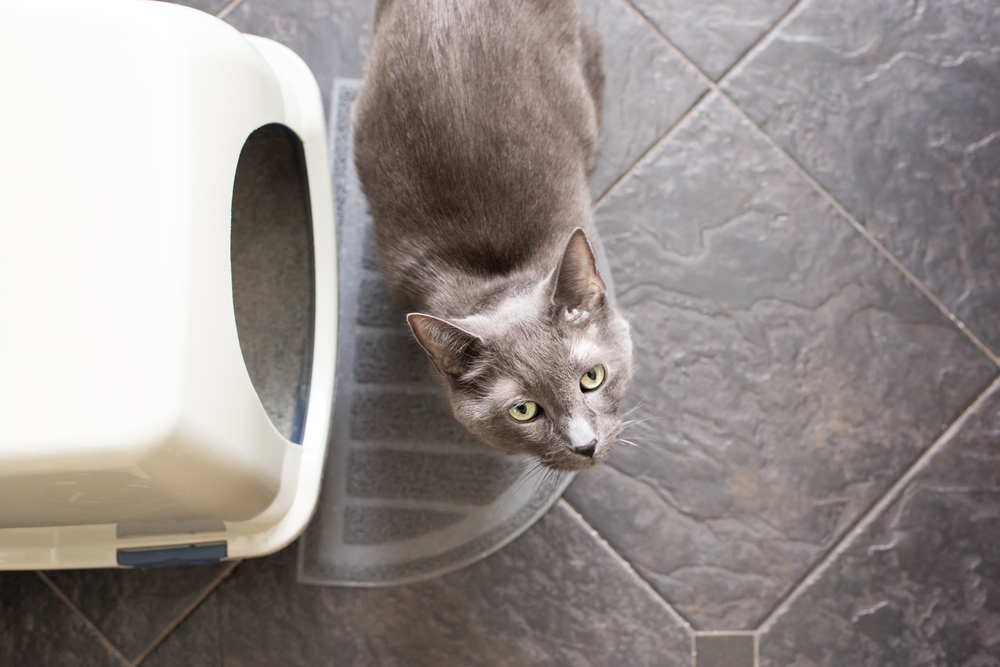If your cat refuses to use their litter box, you may be at your wit’s end with their stubborn behavior. However, your cat is simply trying to communicate that something is amiss, whether it’s litter box hygiene, placement, or even litter type. Other times, your cat may be suffering from a serious medical issue that can lead to inappropriate elimination. To ensure your cat uses their litter box correctly, our team at Animal Clinic of Council Bluffs offers these seven rules of the box.
#1: Ensure your cat has multiple litter box options
Follow the golden rule of litter box numbers: You should have one litter box per cat in your household, plus one. For example, a three-cat household should have at least four litter boxes to provide options for each cat. Providing multiple litter boxes ensures your cat will never be far away from a box when nature calls.
#2: Keep your cat’s litter box clean
No one, much less your finicky feline, wants to use a dirty bathroom. Having two cats sharing the same litter box and failing to scoop it out several times a day is a recipe for inappropriate elimination. Instead, scoop all litter boxes at least twice per day to ensure they have plenty of unclumped litter for your cat to use. Additionally, dump the entire box each week and sanitize it to eliminate foul odors and messes before adding fresh litter.
#3: Use your cat’s preferred litter
Much like people have a preferred toilet paper brand, cats typically have a preferred litter type. In general, most cats choose a fine, unscented, clumping litter over any other type. However, your cat may opt for a different variety, so experiment with litter types as needed.
#4: Consider litter box placement for maximum appeal
Trying to do your business in the middle of the busiest room in the house or next to the noisy washer and dryer can be a challenge. Consider the best spots to place your cat’s box to guarantee they won’t be driven away. When searching for a spot to put your cat’s box, follow these tips:
- Ensure the box is easily accessible and isn’t shoved into a tight corner.
- Keep the box away from main gathering areas and walkways.
- Avoid putting the box next to noisy, startling appliances.
- Place a box on each level of your home.
- Avoid placing a box next to your cat’s food and water dishes.
If your cat seems to avoid a particular box, place it in a new, quieter location that may be easier to access.
#5: Watch carefully for bullying in your household
Bullying among cats can be difficult to spot, but it can cause a host of elimination issues. For example, if one cat sits and stares at another cat while they’re trying to use a litter box, it may cause that cat to find a safer place to eliminate, like in your closet or under your bed. A cat can also feel trapped if you only provide covered litter boxes, and, if a bullying situation exists, the bullied cat may avoid the box completely to remain safe. Watch your cats’ interactions closely to ensure no resource guarding or tense behavior occurs.
#6: Measure the size of your cat’s litter box
Some house cats can grow to be quite large and may have difficulty fitting inside standard litter boxes. Ideally, your cat’s litter box should be one and a half times the length of your cat from nose to tail, and wide enough for your cat to turn around comfortably. Without ample space, your cat’s hind end may hang over the edge, or they may refuse to use the box at all. Shallow totes that are typically used for under-the-bed storage make a great litter box option for larger cats.
#7: Schedule an appointment with your Animal Clinic of Council Bluffs veterinarian

If you’re taking care of your cat’s elimination needs with a clean litter box, appropriate placement, and proper size, but your feline friend is still having accidents, they may be suffering from a medical condition. Many health issues can cause your cat to eliminate outside their litter box, so a thorough physical exam and diagnostic testing are needed to rule out potential medical causes. Possible medical conditions that can lead to inappropriate elimination include:
- Urinary tract infection (UTI)
- Feline idiopathic cystitis (FIC)
- Kidney disease
- Hyperthyroidism
- Inflammatory bowel disease
- Diabetes
- Osteoarthritis
- Cancer
If your cat refuses to use their litter box, they could be suffering from a serious medical condition. Don’t chalk up inappropriate elimination to bad behavior—schedule an appointment with our Animal Clinic of Council Bluffs team to get your feline friend the help they need instead.






Leave A Comment